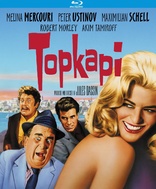Topkapi Blu-ray Movie
HomeTopkapi Blu-ray Movie 
Kino Lorber | 1964 | 120 min | Not rated | Oct 07, 2014Movie rating
7 | / 10 |
Blu-ray rating
| Users | 4.0 | |
| Reviewer | 3.5 | |
| Overall | 3.5 |
Overview
Topkapi (1964)
Thought by many to be the inspiration for the TV series 'Mission: Impossible', Jules Dassin's comedy-thriller follows a group of art thieves as they plot and plan to rob a jewelled dagger from the fortress-like Topkapi Palace museum in sun-soaked Istanbul. With an international cast and a screenplay written by ex-Ealing stalwart Monja Danischewsky, 'Topkapi' is one of the great comic-exotic heist movies.
Starring: Melina Mercouri, Peter Ustinov, Maximilian Schell, Robert Morley, Jess HahnDirector: Jules Dassin
| Thriller | Uncertain |
| Heist | Uncertain |
| Crime | Uncertain |
| Adventure | Uncertain |
Specifications
Video
Video codec: MPEG-4 AVC
Video resolution: 1080p
Aspect ratio: 1.66:1
Original aspect ratio: 1.66:1
Audio
English: DTS-HD Master Audio 2.0
Subtitles
None
Discs
25GB Blu-ray Disc
Single disc (1 BD)
Playback
Region A (locked)
Review
Rating summary
| Movie | 4.0 | |
| Video | 3.0 | |
| Audio | 3.5 | |
| Extras | 0.5 | |
| Overall | 3.5 |
Topkapi Blu-ray Movie Review
Dishonor among thieves.
Reviewed by Jeffrey Kauffman October 19, 2014As with many left leaning artists who found their careers colliding with blacklists and the House Un-American Activities Committee in the late 1940s and early 1950s, Jules Dassin retreated to the relative safety of Europe once it became clear his days in Hollywood were numbered. Unlike some of his contemporaries, though, Dassin flourished rather well overseas, contributing what many consider the grandaddy of all heist or caper films, Rififi, in 1955. Dassin had an international hit of major proportions on his hands in 1960 when Melina Mercouri lit up the screen as “working woman” Illya in Never On Sunday, and Dassin reteamed with Mercouri (who would soon be his wife) in 1964 for another major box office success, Topkapi. Topkapi is an interesting amalgamation of Never on Sunday’s naturally ebullient leading lady with a caper scenario that plays like a slightly more whimsical treatment of some of the same ideas depicted in Rififi. Dassin almost assaults the viewer as Topkapi opens, with a quasi-hallucinatory prelude that sees Mercouri, as Elizabeth Lipp, break the fourth wall while directly addressing the audience about her madcap idea to steal a priceless dagger with several incredible emeralds encrusted in its handle. And that’s really more than half the set up of Topkapi, a film that wastes little time in backstories or character beats as it marauds somewhat mischievously through Elizabeth’s cohorts’ attempts to purloin the bejeweled object. Only the appearance of Peter Ustinov as so-called “shmoe” Arthur Simon Simpson finally introduces a wonderfully unexpected element into the caper, one that gives Topkapi a lot of its delightful comic edge.

Elizabeth Lipp (who, considering Mercouri’s rather peculiar idiolect might better be named Lisp) is a self-announced thief in the film’s opening sequence, and she soon reunites with her former paramour and partner in crime, Swiss mastermind Walter Harper (Maximilian Schell). Walter agrees to help Elizabeth steal the Topkapi dagger, but only if she agrees to one condition: he wants to use amateurs who will have no police records and will therefore be off the investigators’ radar once the theft is discovered. Topkapi plays a bit like Mission: Impossible (the television series—more about the film in a moment) in that Walter obviously already has a plan in place and information is only going to be doled out to the viewer in dribs and drabs, and then mostly as it’s actually occurring.
That plan involves a fanciful toymaker named Cedric Page (Robert Morley), who informs them of just how impossible it’s going to be to steal the dagger, since it’s in a room with an alarm laden floor that will react to even a featherweight difference of pressure. Walter of course seems to have already taken that into account, at least as evidenced by his odd display of a toilet plunger.
But before the caper can actually even be detailed more than it already has been, Harper and Topkapi itself engage in an unexpected detour when Harper tells Elizabeth that what they really need is a good patsy, a “shmoe” in Harper’s vernacular. They find the perfect candidate in a low life Arthur Simon Simpson (Peter Ustinov), a fumbling purveyor of faux antiques whom Harper instantly identifies as just the sort of fool he’s in need of. He recruits Simpson to drive a Lincoln into Turkey under mysterious circumstances, offering him $100 for completing the task, something that Simpson is more than happy to do (and be paid for).
While it’s still unclear exactly what’s going on, that perhaps only makes Simpson’s ultimate plight more believable for the audience, for when he does try to pass through a border crossing, he’s caught first in some subterfuge with regard to his passport, and then, when the Lincoln is thoroughly searched, something a good deal more criminal. Simpson is interrogated by the Turkish version of men in black (who are indeed clad in black suits and wear sunglasses), and is basically informed that if he wants to stay out of prison he’s now going to be working for the Turkish intelligence forces, since they have come to the wrong conclusion that Simpson was the unwitting dupe of a forthcoming assassination attempt.
That sets up the central tension of the film (outside of the heist itself, of course), where Simpson is reintroduced to Harper, Elizabeth and the rest of their crew while ostensibly also spying on them for the undercover operatives who are tailing the group. To say more would spoil several wonderful little twists Dassin has hidden up his sleeve, including a late change in personnel that makes Simpson more of a player than even he intended to be.
Dassin toys with his audience almost like a cat with mouse throughout Topkapi. From the in your face opening, which almost seems to be Dassin giving a major raspberry to Hollywood conformity, through the elegantly staged heist sequence, Dassin is completely in control of the story and the staging. There is one tour de force moment right in the middle of the main theft scene that bears special accolades. The sequence, which obviously inspired Tom Cruise’s aerial acrobatics in Mission: Impossible, includes an incredibly effective series of quick edits as Harper and Simpson attempt to navigate some ropes and pulleys to keep a case and a suspended thief from setting off the alarm. But for anyone who hasn’t yet seen the film (and perhaps even for those who have), simply pay attention to the incredible edit (with attendant sound effect) that Dassin utilizes at the climax of the sequence. It’s startling in every sense of the word.
Mercouri’s patented brand of earthiness conflicts just a bit with the supposedly glamorous side of Elizabeth, but that’s one of the few niggling missteps in what is otherwise a perfectly cast film. Schell is surprisingly spry as a semi-comic leading man, but of course Topkapi belongs hook, line and sinker to Peter Ustinov, who took home his second Supporting Actor Academy Award for this role. Ustinov’s Simpson is hilariously conniving but just as comedically inept, and his portrayal is one of the highlights not just of this film, but of Ustinov’s entire career.
Topkapi Blu-ray Movie, Video Quality 
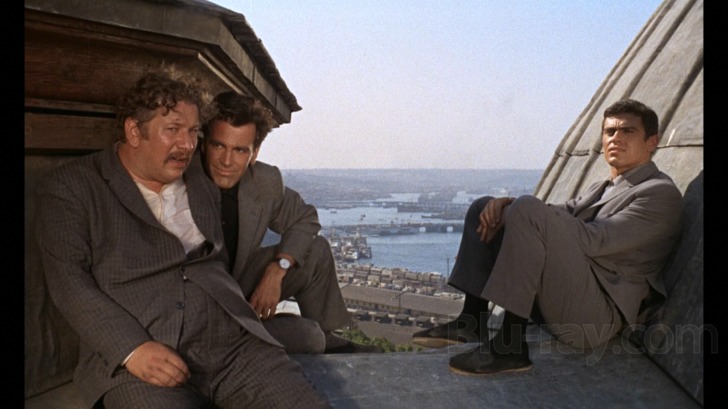
Topkapi is presented on Blu-ray courtesy of Kino Lorber Studio Classics with an AVC encoded 1080p transfer in 1.66:1. Some may be unpleasantly discouraged by the look of Topkapi for its first few minutes, but it's important to realize that the opening sequence is one large optical effect courtesy of the swirling kaleidoscope colors (and other elements like Mercouri's repeated face on the spinning wheel). That makes the opening extremely soft and grainy looking (see screenshot 6), something that's exacerbated somewhat by this transfer's overall less than solid contrast. Once the opening sequence gives way to the post-credits section of the film, things improve markedly, though there is still inconsistent color which includes fading. This can leave colors skewing toward brown and the overall palette looking a bit worn and tired. Blues still come through very well, making a lot of the water and sky shots look quite appealing. Sharpness and clarity are average, with close-ups faring best (see screenshot 3). All of this said, Topkapi has never really been a traditionally beautiful looking film in any previous home video incarnation, and this Blu-ray certainly increases saturation and general detail decently if not overwhelmingly. Grain resolves naturally throughout the presentation and there are no issues with artifacts. Elements have their fair share of damage, but there are no signs of intrusive digital manipulation of the image. It should be noted that the closing credits are windowboxed.
Topkapi Blu-ray Movie, Audio Quality 
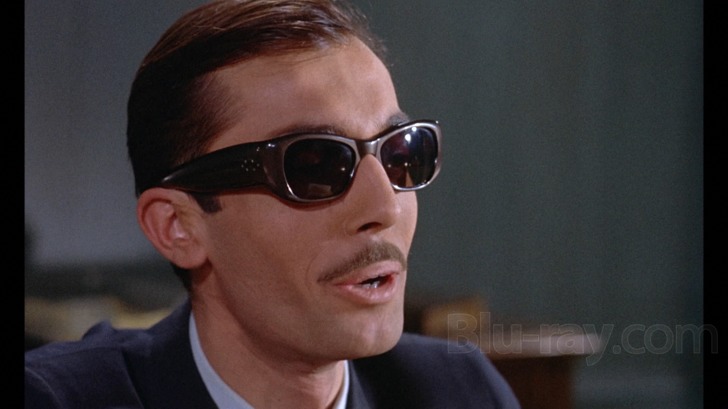
Topkapi features a lossless DTS-HD Master Audio 2.0 mono mix which offers very cleanly presented dialogue, even if some of the thick accents are a bit hard to fathom at times (this release could have benefited from subtitles). Manos Hadjidakis contributes a slightly anachronistic score which perhaps understandably sounds more Greek than Turkish. That's Ms. Mercouri herself singing in the opening moments of the film. Broadway fans will know one of her post-Topkapi performances was in the Broadway musical version of Never on Sunday, which was called Illya, Darling! and which featured music by Hadjidakis. There are no issues with this problem free track.
Topkapi Blu-ray Movie, Special Features and Extras 
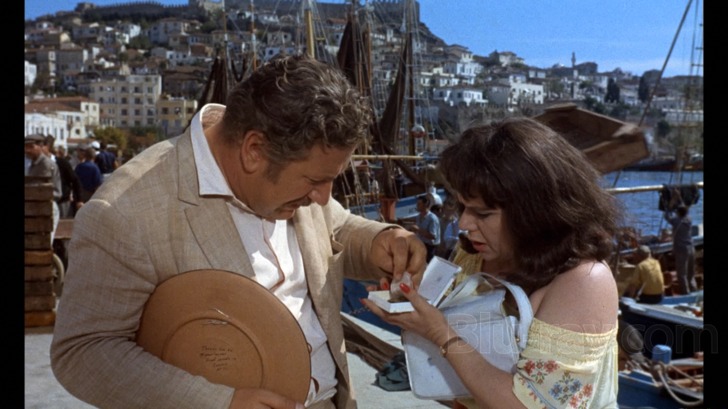
- Trailer (1080i; 3:48)
Topkapi Blu-ray Movie, Overall Score and Recommendation 
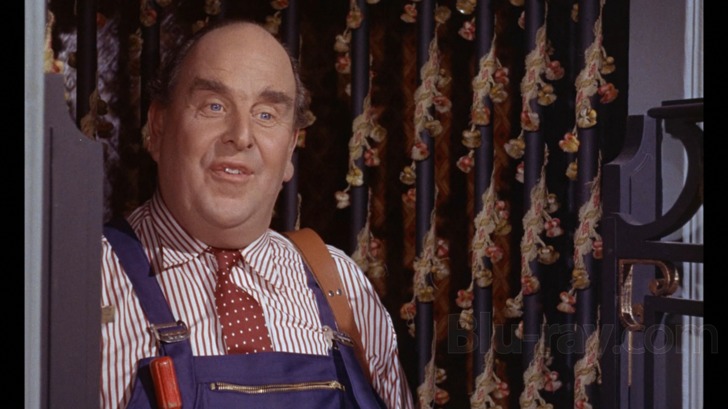
Topkapi remains one of the most ebulliently fun caper movies of all time, one that is buoyed ineffably by the pitch perfect performance of Peter Ustinov. Dassin's mastery is subtle at times, but holds up to rigorous analysis, especially after repeated viewings of the film. Technical merits here are okay, if unspectacular, but those who have had previous home video releases of Topkapi will know that the film has always had a certain rough appearance. Given reasonable expectations for video quality, and with an understanding of just how wonderful the film is, overall Topkapi comes Recommended.
Similar titles
Similar titles you might also like

Mission: Impossible: The Original TV Series
1966-1973

Assault on a Queen
1966

Killer Force
The Diamond Mercenaries
1976

The Great Train Robbery
The First Great Train Robbery / Reissue
1978

Target
1985

Frantic
1988

The Devil's 8
1969

Q & A
1990

In Like Flint
Limited Edition to 3000 - SOLD OUT
1967

The Defiant Ones
1958

Hickey & Boggs
1972

23 Paces to Baker Street
1956

Woman of Straw
1964

The Day of the Jackal
1973

Thunderbolt and Lightfoot 4K
1974

Number One with a Bullet
1987

The League of Gentlemen
1960

Blood Money
2017

The Weapon
1956

Underwater!
Warner Archive Collection
1955
